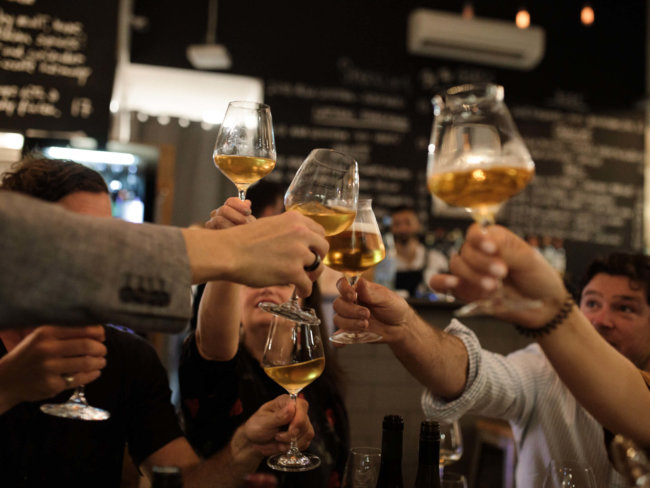7 October 2019. Words by Ryan Larkin.
Images by James Morgan.
What is natural wine?
We asked Ryan Larkin, specialist importer of French natural wine, to unpack what natural wine is meant to be, and how the firm philosophical foundations of the movement have been muddied by what has become an explosive and often confusing trend. Clear crown-sealed bottle, colourful hand-applied label, orange-hued hazy wine… natural? Not necessarily…
When my late mum first found out she had cancer, she made a lot of changes in her life. One of them was to only eat organic food. That was 20 years ago, and it stuck with me. Ever since, I have tried to always eat organic wherever possible. Later, a good friend asked me why I ate organic foods but didn’t drink organic wine. That was the moment that led me to discover natural wines.
I became interested in them for health and ethical reasons, and later discovered their unmatched vitality, energy, purity and diversity. Back then, there wasn’t any uncertainty about what natural wine was. It was simple: the grapes must be from an unirrigated organic or biodynamic vineyard; grapes are harvested by hand and fermented with their indigenous yeasts (which occur naturally on the grapes or in the winery); no new oak; no additives whatsoever, except for small amounts of sulfites (0–40 mg/L is acceptable, although most people use around 0–20 mg/L); no fining or filtration – and that was it. Once you delved into the world of natural wines, this seemed like standard knowledge (especially in France), and there was consensus amongst the industry.
Fast forward to today, and there is confusion. Natural wines have always been made, but what started out as a relatively underground movement has now exploded into a global phenomenon. The internet and social media have played a huge part in this, in both positive and negative ways. Natural wine is not a trend, but it is trendy. There is hype, there are cool labels, there are crazy people doing funky things, there is publicity from famous people who know next to nothing about the subject. Some are exploiting it and using these ideas to make sales, even if their wines aren’t natural. People with little knowledge or experience are writing articles which can mislead the public, making it all very perplexing. We have become complacent in understanding what it is all really about. It’s a bit of a mess – for now.
With no universal legal definition, the term has been abused. What started out as a relatively clear description of the requirements – well known amongst winemakers, importers, retailers and enthusiasts – has now been turned into a battle of opinions on what natural wine is. I have seen people claim that wines are natural because they have no sulfites, even if the grapes weren’t organic. I have known winemakers who say their wines are completely natural, only to find out they have purchased chemically farmed grapes and are making their wines in a winery where other winemakers make conventional wines (read unnatural yeasts present). It’s common to see people hashtag wines as ‘natural’ on Instagram just because they have a colourful label (as a lot of natural wines do), starting a chain reaction of misinformation. Clever old marketing.
There is also a common misperception that all natural wines are weird, funky, cloudy, crazy, faulty and so on. While this is true in some instances, it doesn’t represent the holistic picture – natural wines can also be clean, pure, stable, have zero faults and can infinitely outdo their conventional counterparts. When some of the first Australian natural wines (and some imports) entered the market, many were incredibly faulty and basically undrinkable. This created a stereotype, which turned many sommeliers and customers away from natural wines. But to put them all into one box is ignorant. Many people who think they dislike natural wines, drink them and love them without even knowing they’re natural.
So where are we headed? Good things take time, and I think we’re on the right road. Read, listen, travel, learn. Ask questions. Keep an open mind and make informed decisions about what you drink. Once the dust settles, the mainstream will forget the short-term hype and turn their attention back to the genuine people (not companies) who make these wines. The incredible amount of hard work that goes into farming and producing these living wines will become more apparent, rather than what someone says is hot or popular at that moment. People are becoming more conscious, which is increasing demand, and so there will be more natural wine produced – and this can only be a good thing. And, as consumers, we need to demand transparency – learn who to trust, and never assume. Do we need regulation? Maybe. But red tape is another topic altogether. Evolution is happening, consciousness is increasing and even though the journey has its ups and downs, the path is positive. There’s no turning back.
Ryan Larkin is a specialist importer, wholesaler and online retailer of French natural wines. Often classed as an obsessive wine nerd, he spends all of his money on wine because you can’t drink a house. Apart from travelling to France twice a year to work directly with natural winemakers, he also scours the globe for unicorns and snow leopards, and is known for opening these rarities with other like-minded aficionados. You can find him on Instagram at @r_larkin or at larkinimports.com.au





